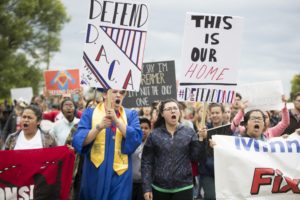 DACA’s young people grew up in this country. They went to school with our children; they embraced American values, they became our kin, friends, students, and colleagues. This administration is brazenly threatening them with expulsion and exile. There are no words to describe the dread they feel that they might become fugitives, stripped of their American identity, home and life, as they have known it.
DACA’s young people grew up in this country. They went to school with our children; they embraced American values, they became our kin, friends, students, and colleagues. This administration is brazenly threatening them with expulsion and exile. There are no words to describe the dread they feel that they might become fugitives, stripped of their American identity, home and life, as they have known it.
Those, like Jeff Sessions, who so callously would exile 800.000 amazingly courageous young people, suffer from amnesia. They refuse to remember their own histories, their ancestors who came to this country for a better life. Fleeing religious persecutions, despotic kings, poverty, famine, and hardships. They came with the same hopes and aspiration of DACA’s parents when they entered. No difference. Those who plot expulsion, use amnesia/blindness to ignore the fact that their immigrant ancestors and DACA parents shaped, and continue to shape American democracy. All immigrants have entered this country with similar aims.
Knowing hardship and entering the land with hope infuses the Torah reading this Shabbat. The reading, Parshat Ki Tavo, takes its name from the opening verse, “When you enter the land.” The very first thing that the entering Israelites have to do in an agrarian society is to share the first harvest with those in need. Every person needs to take from the produce of the land and go to the place of God’s choice of dwelling; they then hand the basket to the priest, the Kohen in charge. As the Kohen places it on the alter, each Israelite has to recite the purpose for bringing the food basket.
Every person recounts a brief collective Jewish history, which is told interchangeably in both the singular, “I,” and the plural, “we.” Each one tells the story of how our ancestor, a fugitive Aramean went to Egypt became, a nation and then enslaved; the suffering ancestors cried out to God. God saw our oppression and freed us from Egypt. God brought us to this place of milk and honey. Now that we harvested our crops we bring from the first fruit. Each person has to declare that that they have given to those in need, to the stranger, the widow and the orphan, so “that they may eat their fill.” Adding, “I have not forgotten.”
Why the ritual? Is it not enough to give? Why should each person recount a history to the Kohen? Why declare that we have not forgotten to fulfill the mitzvah of giving to the marginalized?
In Deuteronomy (26:1-15) the Torah recognizes how easy it is for us, in good time to forget, to avert eyes from suffering around. For us in Jewish America the threat to DACA opens precious pages from family albums, exposing unbearable memories. Photos in black and white of Jewish children in WWII knocking on closed doors of democracies. We remember. We cannot let it happen this time to the DACA children.
Those in the administration, like Jeff Sessions, must be reminded that this country was founded by waves of immigrants from all over the world, beginning with the Puritans; that this country was built by slaves; that the land belonged to Native Americans. All decent Americans must stand with DACA because we refuse to add another atrocity to our painful history.
We in our time read Ki Tavo in its broader sense of what we need to do when we enter prosperity. We draw on the ritual to nurture our giving, our empathy for those in need. Reading Deuteronomy gives us a sense of our common humanity when we stand with DACA.